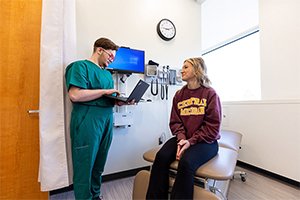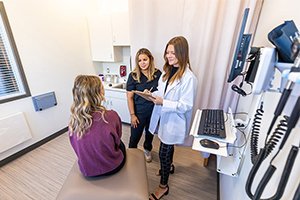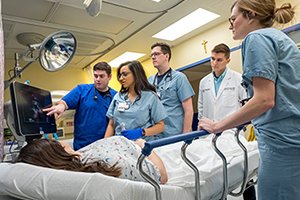LPN Programs and the RN to BSN
 Are you considering a career in nursing, but are confused about which nursing degree to pursue? With multiple pathways available, understanding the differences between each level of nursing can help you make an informed decision.
Are you considering a career in nursing, but are confused about which nursing degree to pursue? With multiple pathways available, understanding the differences between each level of nursing can help you make an informed decision.
Read on for a description of various nursing degrees. From the Licensed Practical Nurse credentials to doctoral programs, we’ll highlight roles, salaries and educational requirements. Let's break down the types of nursing degrees available, the job roles associated with each and what you might expect in terms of salary!
Explore nursing programs and find the one that best fits your goals.
LPN vs. RN
Both Licensed Practical Nurses and Registered Nurses play essential roles in the healthcare system, but their responsibilities and scope of practice differ significantly.
Difference between LPN and RN
LPNs (Licensed Practical Nurses)
- Provide basic patient care and take vital signs.
- Assist with daily living activities.
- Administer medications under supervision of RNs or doctors.
- Typically work in nursing homes, rehabilitation centers and hospitals to provide direct, hands-on care.
RNs (Registered Nurses)
- Often assume leadership roles within healthcare teams.
- Require more extensive education and training compared to LPNs.
- Can specialize in areas such as pediatrics, critical care or oncology.
- Conduct patient assessments and develop care plans.
- Coordinate with other healthcare professionals for comprehensive care.
RN to BSN
The RN to BSN pathway allows registered nurses with an associate degree or diploma to earn their Bachelor of Science in Nursing. Working professionals take advantage of the flexible schedules and online classes available for these programs.
Completing an RN to BSN program can open doors to higher-paying positions and specialized roles within the nursing field. Many employers prefer or even require a BSN for leadership and educational roles, which typically come with higher salaries and more responsibilities. Upon obtaining a BSN, RNs may see their salaries increase, with many earning upwards of $80,000 annually, depending on job role and location.
Bachelor of Science in Nursing
The RN to BSN generally takes about 1-2 years to complete, depending on the institution and the student's pace. It builds on existing nursing knowledge, offering advanced courses in leadership, research and public health. Popular pathways to nursing careers are RN to BSN online programs.
Types of nursing degrees
 Nursing offers a variety of educational pathways, each leading to different levels of responsibility and specialization. Each nursing degree requires a different level of educational commitment. LPN programs are the quickest, usually taking about a year, while doctoral programs can take up to six years.
Nursing offers a variety of educational pathways, each leading to different levels of responsibility and specialization. Each nursing degree requires a different level of educational commitment. LPN programs are the quickest, usually taking about a year, while doctoral programs can take up to six years.
Your choice will depend on how much time and resources you can invest in your education. Here’s a breakdown of the most common pathways to a nursing career:
- LPN
- RN
- RN to BSN
- MSN
- DN
Licensed Practical Nurse
An LPN, or Licensed Practical Nurse, provides basic medical care under the supervision of registered nurses and doctors. If you’re looking to jumpstart your nursing career relatively quickly, enrolling in LPN programs might be the right route for you. This role typically involves tasks like monitoring patients' health, administering medications and assisting with daily activities such as bathing and dressing.
According to the Bureau of Labor Statistics, the median annual salary for LPNs is around $59,700. While not as high as other nursing roles, the shorter educational period allows you to enter the workforce and start earning sooner. The LPN is often the entry point for many aspiring nurses.
What is an LPN program?
Becoming an LPN usually requires completing a state-approved educational program, which often takes about one year and includes both classroom instruction and clinical practice. Community colleges and technical schools typically offer LPN classes. Upon completion, you'll need to pass the National Council Licensure Examination for Practical Nurses to obtain your license.
Registered Nurse
Registered Nurses play a critical role in patient care, working both independently and as part of a healthcare team. They perform a wide range of duties, including conducting physical exams, providing counseling and managing patient care plans.
RNs are often the primary point of contact between patients and the healthcare system. They play a vital role in patient care, coordinating treatment plans, educating patients and families. Another way to identify LPN vs RN is that RNs are often supervising LPNs or nursing assistants.
Educational pathways for RNs
To become an RN, you can choose between two primary educational paths: obtaining an Associate Degree in Nursing or a Bachelor of Science in Nursing. ADN programs typically take two years, while BSN programs are four years long.
After completing the educational requirements, aspiring RNs must pass the NCLEX-RN Exam to obtain licensure. Both the ADN and BSN paths prepare you to take the NCLEX-RN licensure exam. However, an RN to BSN path makes you more competitive in the job market. This path opens more advanced opportunities, and employers are looking for these credentials more and more.
RNs enjoy a significantly higher median annual salary compared to LPNs, with the BLS reporting around an $86,000 salary for RNs. The higher salary reflects the advanced education and expanded responsibilities that come with this role.
What is the NCLEX exam?
There are two types of NCLEX exams, exhibiting another difference in education for the LPN vs RN. Passing the NCLEX-PN grants licensure as a Licensed Practical Nurse, while passing the NCLEX-RN grants licensure as a Registered Nurse.
NCLEX-RN (National Council Licensure Examination for Registered Nurses) is a pivotal step in becoming a licensed RN. After completing an ADN or BSN program, candidates must apply for licensure with their respective state boards of nursing to be eligible for the exam. The process begins by submitting an application, which typically includes proof of education, background checks and fees.
Once approved, candidates will receive an Authorization to Test, allowing them to schedule their exam. The NCLEX-RN is a computer-adaptive test designed to assess a candidate's knowledge and skills in nursing practice.
It focuses on these four areas of practice:
- Providing a safe and effective environment for care.
- Promoting and maintaining health.
- Promoting the psychological, social and emotional well-being of the patient.
- Promoting the physical health and wellness of the patient.
Candidates are allocated a time frame of up to six hours to complete the exam, which is conducted at authorized Pearson VUE test centers.
After completion, results are usually available within a few days, allowing candidates to promptly learn whether they have passed and can move forward in their nursing careers. For additional resources and specific guidelines related to the NCLEX-RN exam, visit the official NCLEX website.
Advanced nursing programs
Master of Science in Nursing
An MSN degree provides advanced clinical training and prepares nurses for specialized roles such as Nurse Practitioner (NP), Clinical Nurse Specialist (CNS) or Advanced Practice Registered Nurse (APRN). MSN programs usually require a BSN for admission and take about 2-3 years to complete. Coursework often includes advanced pharmacology, health assessment and specialized clinical practice.
 Nurses with a MSN degree can expect a competitive salary, with salaries often exceeding $100,000 annually. Specializations like Nurse Anesthetist or Nurse Midwife can command even higher wages.
Nurses with a MSN degree can expect a competitive salary, with salaries often exceeding $100,000 annually. Specializations like Nurse Anesthetist or Nurse Midwife can command even higher wages.
Doctor of Nursing Practice
For those interested in leadership, research or academia, pursuing a Doctor of Nursing Practice (DNP) or a PhD in Nursing can be a rewarding path. The DNP is a practice-focused doctorate aimed at those looking to achieve the highest level of clinical nursing practice.
DNP programs prepare nurses for leadership roles in healthcare settings, advanced clinical practice and faculty positions in nursing schools. These programs typically require a master's degree for entry and take 3-4 years to complete. The curriculum includes courses in healthcare policy, evidence-based practice and advanced clinical skills.
Nurses with a DNP often hold top-tier positions in healthcare organizations, earning well over $120,000 annually. The advanced education and leadership training enable them to influence healthcare policy and improve patient outcomes.
Doctor of Philosophy (PhD) in Nursing
A PhD in Nursing is research-focused, preparing nurses for careers in academia, research and healthcare policy. PhD programs usually require a master's degree and take about 4-6 years to complete. Students engage in rigorous coursework in research methodologies, statistics and theoretical frameworks, culminating in a dissertation.
With a PhD in Nursing, you can pursue a career in academic institutions, research organizations or high-level administrative roles. Salaries vary widely but are generally comparable to those of DNP-prepared nurses, often exceeding $110,000 annually.
What will you do next?
Choosing the right nursing degree depends on your career goals, the level of responsibility you seek and your willingness to invest in education. Whether you're just starting your nursing journey or looking to advance your career, understanding these pathways can help you make an informed decision.
Ready to take the next step? Explore nursing programs and find the one that best fits your aspirations.
RN to BSN pathway at CMU
Right now, Michigan's nursing programs graduate around 3,650 students yearly, but we need more! Central Michigan University is launching a new RN to BSN online program to train future nurses.
 Starting in January of 2025, they're enrolling about 30 students each semester. This is big news because the demand for nurses is growing fast—by about 6% by 2032, expecting an average of over 193,000 openings for registered nurses each year. With help from medical partners like Covenant HealthCare and Trinity Health Grand Rapids, CMU students will use cutting-edge tech like artificial intelligence and giving students great learning opportunities with other healthcare pros.
Starting in January of 2025, they're enrolling about 30 students each semester. This is big news because the demand for nurses is growing fast—by about 6% by 2032, expecting an average of over 193,000 openings for registered nurses each year. With help from medical partners like Covenant HealthCare and Trinity Health Grand Rapids, CMU students will use cutting-edge tech like artificial intelligence and giving students great learning opportunities with other healthcare pros.